An Analysis of International Arbitration Challenges in Pakistan
VerifiedAdded on 2022/08/23
|20
|4435
|19
Project
AI Summary
This research project delves into the realm of international arbitration, specifically focusing on its application and the challenges faced within Pakistan. The study begins with an introduction outlining the background of international arbitration as a dispute resolution mechanism and its increasing significance in a globalized business environment. It highlights the advantages of arbitration, such as neutrality and enforceability, while also identifying the specific problems encountered in Pakistan, including issues related to the implementation of arbitral awards. The research aims to evaluate these challenges, analyze the arbitration process in Pakistan, and offer recommendations for improvement. The literature review explores the foundations of international arbitration, its global importance, and its growth within Asia, emphasizing the need for infrastructure and legal modernization. The methodology chapter outlines the research procedures employed, and the findings and analysis chapter will discuss the data collected, the challenges identified, and propose recommendations. The project concludes with a summary of the findings and suggestions for enhancing the arbitration process in Pakistan.
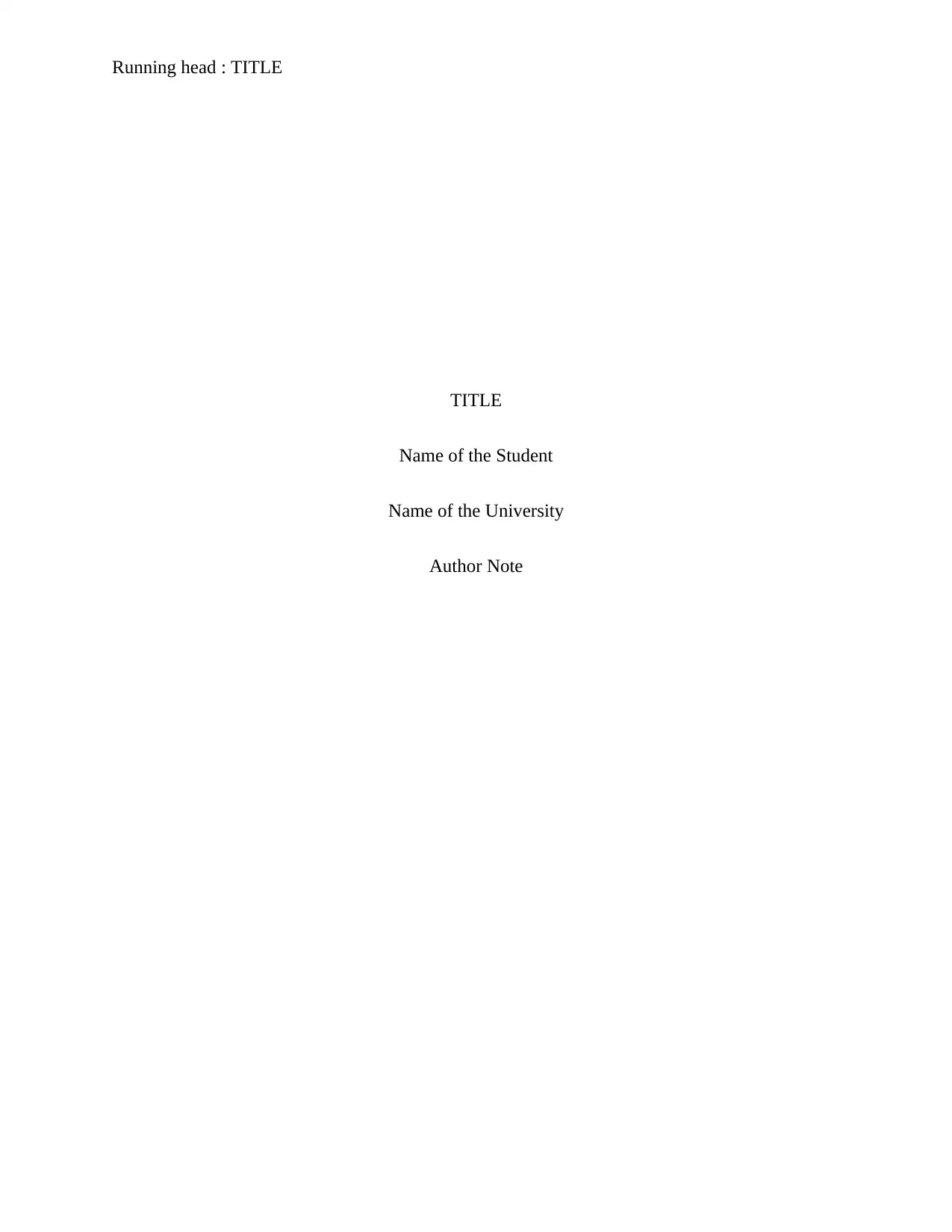
Running head : TITLE
TITLE
Name of the Student
Name of the University
Author Note
TITLE
Name of the Student
Name of the University
Author Note
Paraphrase This Document
Need a fresh take? Get an instant paraphrase of this document with our AI Paraphraser
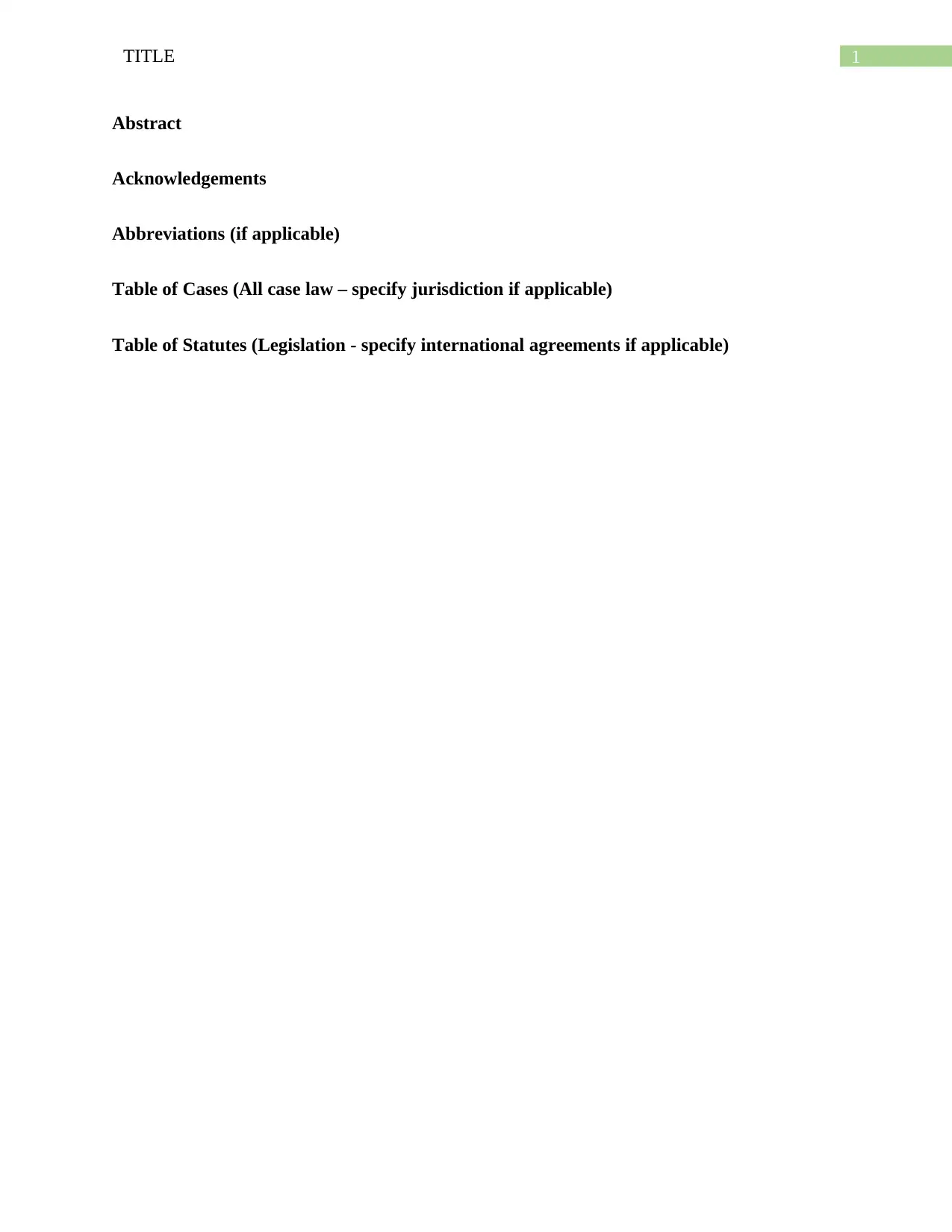
1TITLE
Abstract
Acknowledgements
Abbreviations (if applicable)
Table of Cases (All case law – specify jurisdiction if applicable)
Table of Statutes (Legislation - specify international agreements if applicable)
Abstract
Acknowledgements
Abbreviations (if applicable)
Table of Cases (All case law – specify jurisdiction if applicable)
Table of Statutes (Legislation - specify international agreements if applicable)
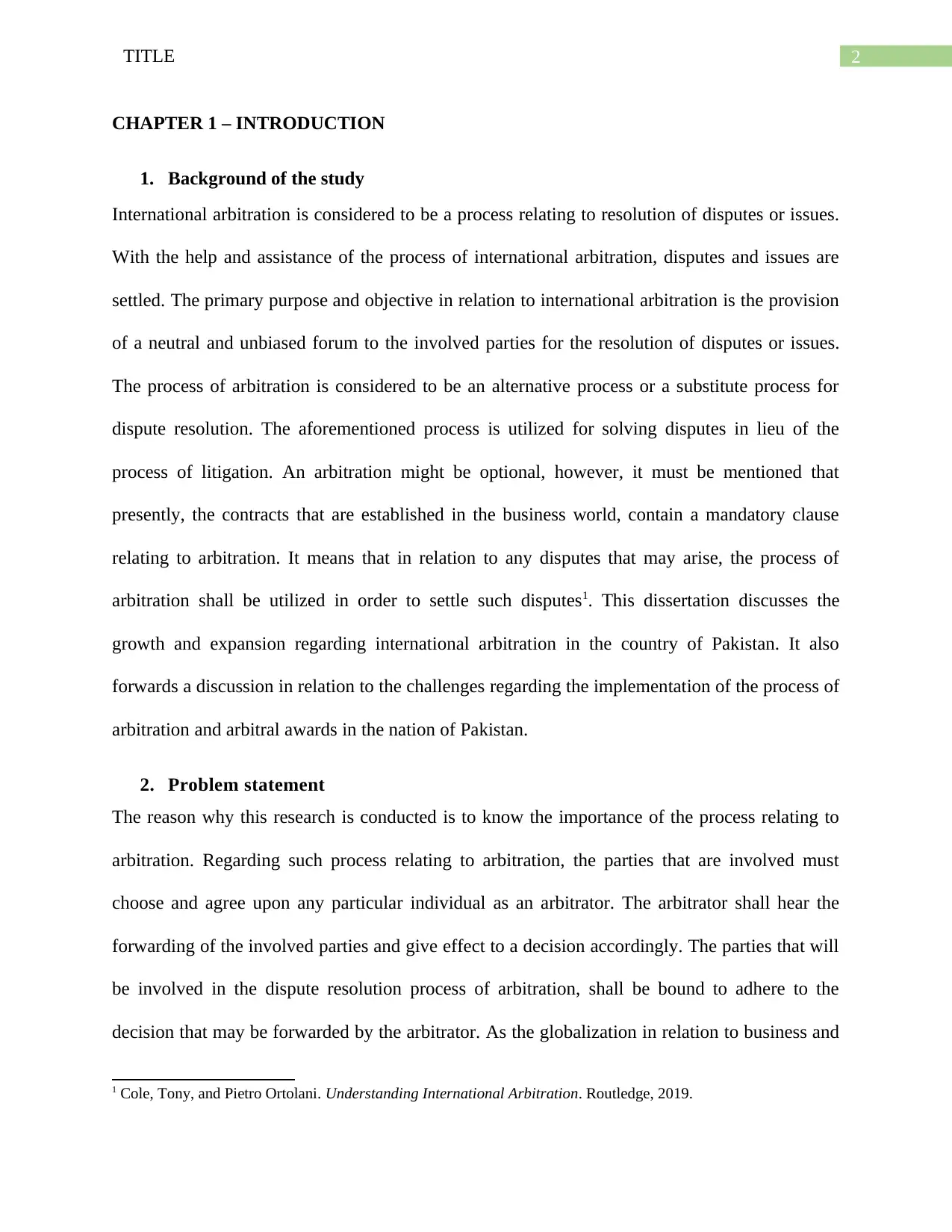
2TITLE
CHAPTER 1 – INTRODUCTION
1. Background of the study
International arbitration is considered to be a process relating to resolution of disputes or issues.
With the help and assistance of the process of international arbitration, disputes and issues are
settled. The primary purpose and objective in relation to international arbitration is the provision
of a neutral and unbiased forum to the involved parties for the resolution of disputes or issues.
The process of arbitration is considered to be an alternative process or a substitute process for
dispute resolution. The aforementioned process is utilized for solving disputes in lieu of the
process of litigation. An arbitration might be optional, however, it must be mentioned that
presently, the contracts that are established in the business world, contain a mandatory clause
relating to arbitration. It means that in relation to any disputes that may arise, the process of
arbitration shall be utilized in order to settle such disputes1. This dissertation discusses the
growth and expansion regarding international arbitration in the country of Pakistan. It also
forwards a discussion in relation to the challenges regarding the implementation of the process of
arbitration and arbitral awards in the nation of Pakistan.
2. Problem statement
The reason why this research is conducted is to know the importance of the process relating to
arbitration. Regarding such process relating to arbitration, the parties that are involved must
choose and agree upon any particular individual as an arbitrator. The arbitrator shall hear the
forwarding of the involved parties and give effect to a decision accordingly. The parties that will
be involved in the dispute resolution process of arbitration, shall be bound to adhere to the
decision that may be forwarded by the arbitrator. As the globalization in relation to business and
1 Cole, Tony, and Pietro Ortolani. Understanding International Arbitration. Routledge, 2019.
CHAPTER 1 – INTRODUCTION
1. Background of the study
International arbitration is considered to be a process relating to resolution of disputes or issues.
With the help and assistance of the process of international arbitration, disputes and issues are
settled. The primary purpose and objective in relation to international arbitration is the provision
of a neutral and unbiased forum to the involved parties for the resolution of disputes or issues.
The process of arbitration is considered to be an alternative process or a substitute process for
dispute resolution. The aforementioned process is utilized for solving disputes in lieu of the
process of litigation. An arbitration might be optional, however, it must be mentioned that
presently, the contracts that are established in the business world, contain a mandatory clause
relating to arbitration. It means that in relation to any disputes that may arise, the process of
arbitration shall be utilized in order to settle such disputes1. This dissertation discusses the
growth and expansion regarding international arbitration in the country of Pakistan. It also
forwards a discussion in relation to the challenges regarding the implementation of the process of
arbitration and arbitral awards in the nation of Pakistan.
2. Problem statement
The reason why this research is conducted is to know the importance of the process relating to
arbitration. Regarding such process relating to arbitration, the parties that are involved must
choose and agree upon any particular individual as an arbitrator. The arbitrator shall hear the
forwarding of the involved parties and give effect to a decision accordingly. The parties that will
be involved in the dispute resolution process of arbitration, shall be bound to adhere to the
decision that may be forwarded by the arbitrator. As the globalization in relation to business and
1 Cole, Tony, and Pietro Ortolani. Understanding International Arbitration. Routledge, 2019.
⊘ This is a preview!⊘
Do you want full access?
Subscribe today to unlock all pages.

Trusted by 1+ million students worldwide
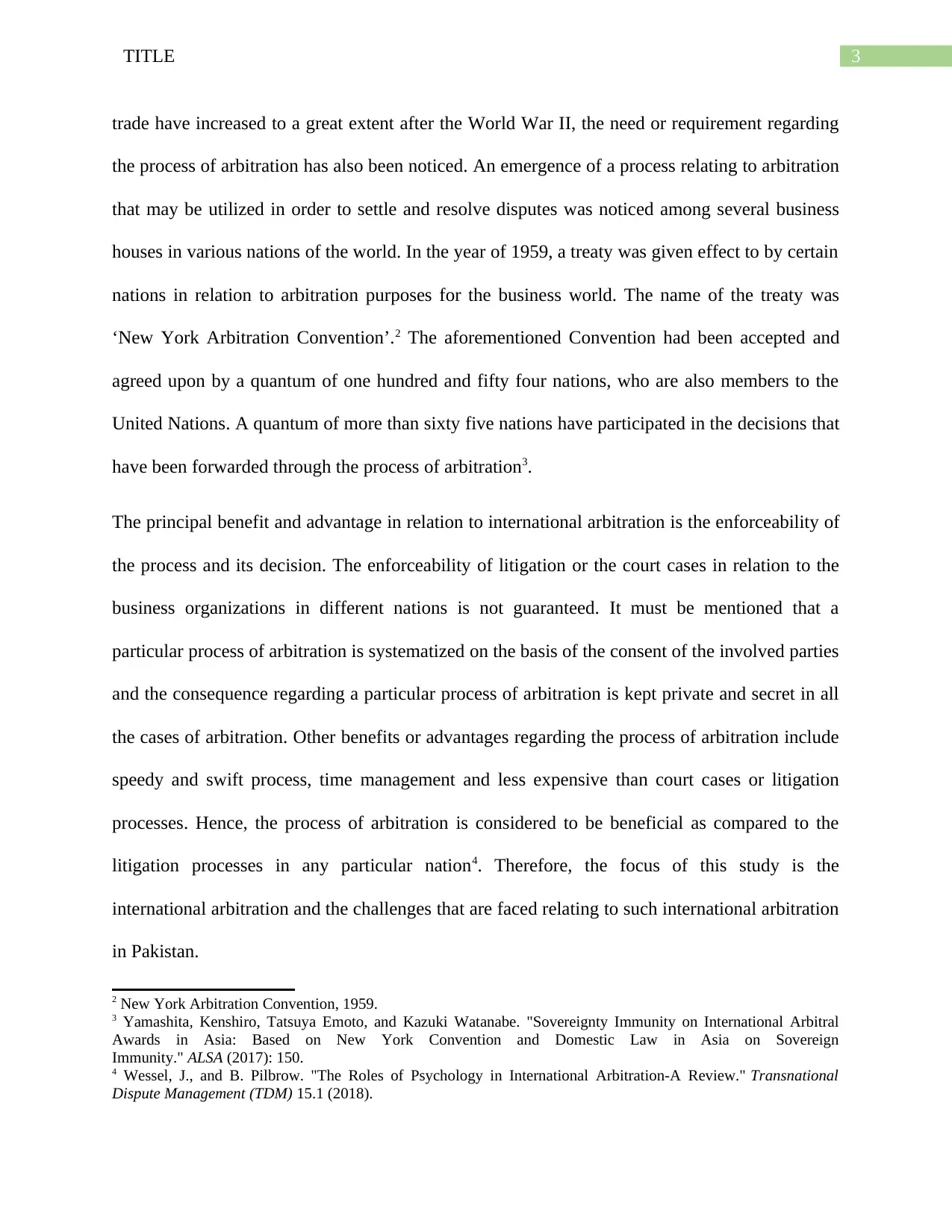
3TITLE
trade have increased to a great extent after the World War II, the need or requirement regarding
the process of arbitration has also been noticed. An emergence of a process relating to arbitration
that may be utilized in order to settle and resolve disputes was noticed among several business
houses in various nations of the world. In the year of 1959, a treaty was given effect to by certain
nations in relation to arbitration purposes for the business world. The name of the treaty was
‘New York Arbitration Convention’.2 The aforementioned Convention had been accepted and
agreed upon by a quantum of one hundred and fifty four nations, who are also members to the
United Nations. A quantum of more than sixty five nations have participated in the decisions that
have been forwarded through the process of arbitration3.
The principal benefit and advantage in relation to international arbitration is the enforceability of
the process and its decision. The enforceability of litigation or the court cases in relation to the
business organizations in different nations is not guaranteed. It must be mentioned that a
particular process of arbitration is systematized on the basis of the consent of the involved parties
and the consequence regarding a particular process of arbitration is kept private and secret in all
the cases of arbitration. Other benefits or advantages regarding the process of arbitration include
speedy and swift process, time management and less expensive than court cases or litigation
processes. Hence, the process of arbitration is considered to be beneficial as compared to the
litigation processes in any particular nation4. Therefore, the focus of this study is the
international arbitration and the challenges that are faced relating to such international arbitration
in Pakistan.
2 New York Arbitration Convention, 1959.
3 Yamashita, Kenshiro, Tatsuya Emoto, and Kazuki Watanabe. "Sovereignty Immunity on International Arbitral
Awards in Asia: Based on New York Convention and Domestic Law in Asia on Sovereign
Immunity." ALSA (2017): 150.
4 Wessel, J., and B. Pilbrow. "The Roles of Psychology in International Arbitration-A Review." Transnational
Dispute Management (TDM) 15.1 (2018).
trade have increased to a great extent after the World War II, the need or requirement regarding
the process of arbitration has also been noticed. An emergence of a process relating to arbitration
that may be utilized in order to settle and resolve disputes was noticed among several business
houses in various nations of the world. In the year of 1959, a treaty was given effect to by certain
nations in relation to arbitration purposes for the business world. The name of the treaty was
‘New York Arbitration Convention’.2 The aforementioned Convention had been accepted and
agreed upon by a quantum of one hundred and fifty four nations, who are also members to the
United Nations. A quantum of more than sixty five nations have participated in the decisions that
have been forwarded through the process of arbitration3.
The principal benefit and advantage in relation to international arbitration is the enforceability of
the process and its decision. The enforceability of litigation or the court cases in relation to the
business organizations in different nations is not guaranteed. It must be mentioned that a
particular process of arbitration is systematized on the basis of the consent of the involved parties
and the consequence regarding a particular process of arbitration is kept private and secret in all
the cases of arbitration. Other benefits or advantages regarding the process of arbitration include
speedy and swift process, time management and less expensive than court cases or litigation
processes. Hence, the process of arbitration is considered to be beneficial as compared to the
litigation processes in any particular nation4. Therefore, the focus of this study is the
international arbitration and the challenges that are faced relating to such international arbitration
in Pakistan.
2 New York Arbitration Convention, 1959.
3 Yamashita, Kenshiro, Tatsuya Emoto, and Kazuki Watanabe. "Sovereignty Immunity on International Arbitral
Awards in Asia: Based on New York Convention and Domestic Law in Asia on Sovereign
Immunity." ALSA (2017): 150.
4 Wessel, J., and B. Pilbrow. "The Roles of Psychology in International Arbitration-A Review." Transnational
Dispute Management (TDM) 15.1 (2018).
Paraphrase This Document
Need a fresh take? Get an instant paraphrase of this document with our AI Paraphraser
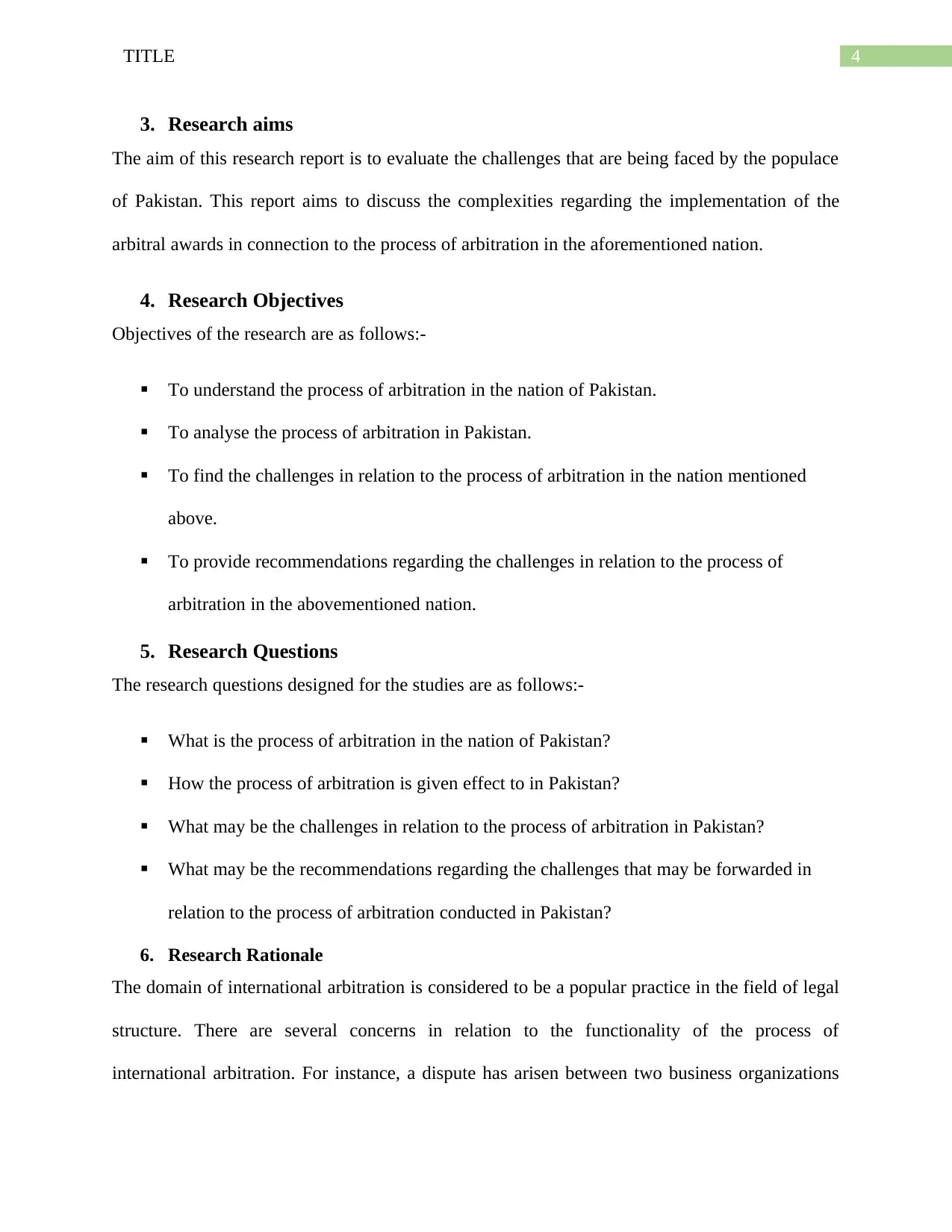
4TITLE
3. Research aims
The aim of this research report is to evaluate the challenges that are being faced by the populace
of Pakistan. This report aims to discuss the complexities regarding the implementation of the
arbitral awards in connection to the process of arbitration in the aforementioned nation.
4. Research Objectives
Objectives of the research are as follows:-
To understand the process of arbitration in the nation of Pakistan.
To analyse the process of arbitration in Pakistan.
To find the challenges in relation to the process of arbitration in the nation mentioned
above.
To provide recommendations regarding the challenges in relation to the process of
arbitration in the abovementioned nation.
5. Research Questions
The research questions designed for the studies are as follows:-
What is the process of arbitration in the nation of Pakistan?
How the process of arbitration is given effect to in Pakistan?
What may be the challenges in relation to the process of arbitration in Pakistan?
What may be the recommendations regarding the challenges that may be forwarded in
relation to the process of arbitration conducted in Pakistan?
6. Research Rationale
The domain of international arbitration is considered to be a popular practice in the field of legal
structure. There are several concerns in relation to the functionality of the process of
international arbitration. For instance, a dispute has arisen between two business organizations
3. Research aims
The aim of this research report is to evaluate the challenges that are being faced by the populace
of Pakistan. This report aims to discuss the complexities regarding the implementation of the
arbitral awards in connection to the process of arbitration in the aforementioned nation.
4. Research Objectives
Objectives of the research are as follows:-
To understand the process of arbitration in the nation of Pakistan.
To analyse the process of arbitration in Pakistan.
To find the challenges in relation to the process of arbitration in the nation mentioned
above.
To provide recommendations regarding the challenges in relation to the process of
arbitration in the abovementioned nation.
5. Research Questions
The research questions designed for the studies are as follows:-
What is the process of arbitration in the nation of Pakistan?
How the process of arbitration is given effect to in Pakistan?
What may be the challenges in relation to the process of arbitration in Pakistan?
What may be the recommendations regarding the challenges that may be forwarded in
relation to the process of arbitration conducted in Pakistan?
6. Research Rationale
The domain of international arbitration is considered to be a popular practice in the field of legal
structure. There are several concerns in relation to the functionality of the process of
international arbitration. For instance, a dispute has arisen between two business organizations
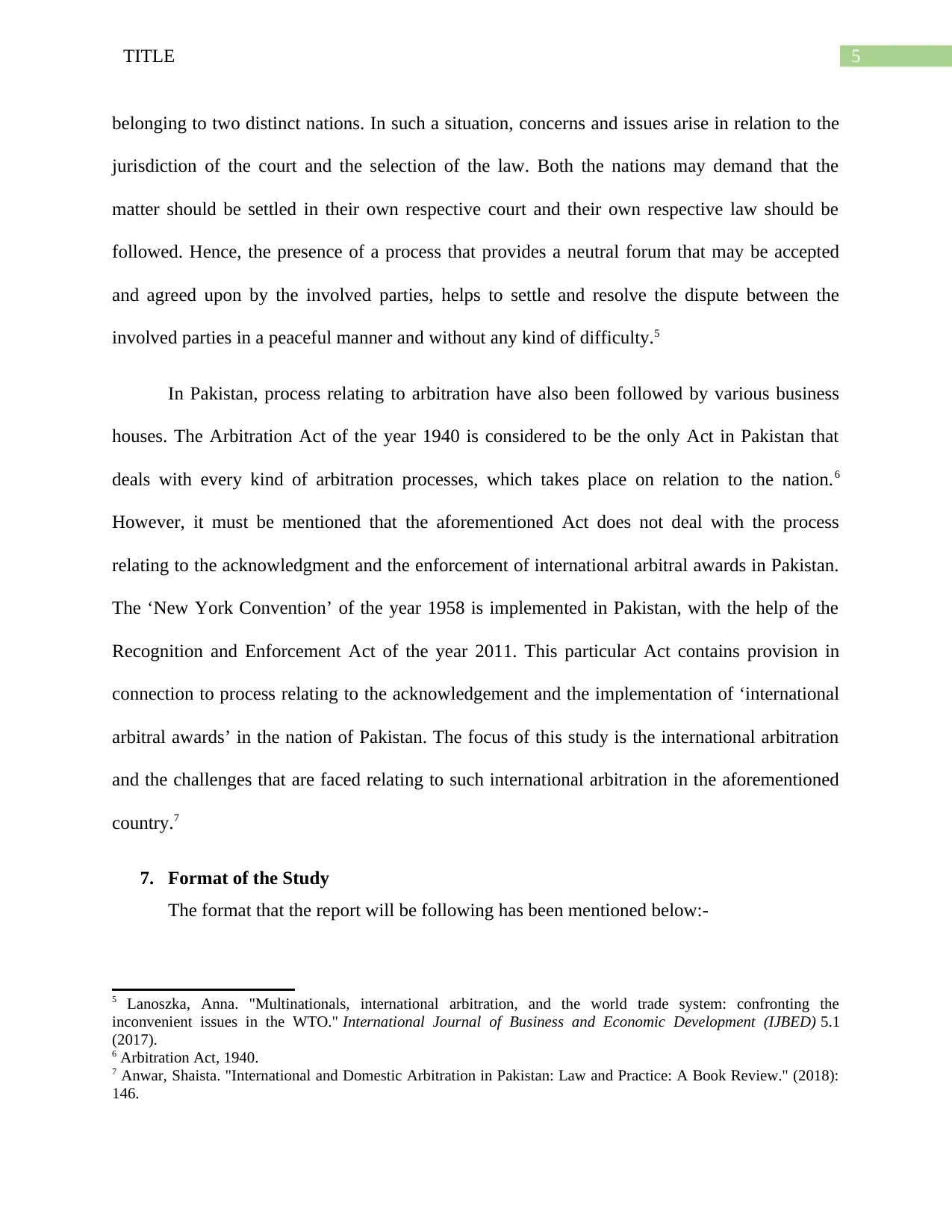
5TITLE
belonging to two distinct nations. In such a situation, concerns and issues arise in relation to the
jurisdiction of the court and the selection of the law. Both the nations may demand that the
matter should be settled in their own respective court and their own respective law should be
followed. Hence, the presence of a process that provides a neutral forum that may be accepted
and agreed upon by the involved parties, helps to settle and resolve the dispute between the
involved parties in a peaceful manner and without any kind of difficulty.5
In Pakistan, process relating to arbitration have also been followed by various business
houses. The Arbitration Act of the year 1940 is considered to be the only Act in Pakistan that
deals with every kind of arbitration processes, which takes place on relation to the nation.6
However, it must be mentioned that the aforementioned Act does not deal with the process
relating to the acknowledgment and the enforcement of international arbitral awards in Pakistan.
The ‘New York Convention’ of the year 1958 is implemented in Pakistan, with the help of the
Recognition and Enforcement Act of the year 2011. This particular Act contains provision in
connection to process relating to the acknowledgement and the implementation of ‘international
arbitral awards’ in the nation of Pakistan. The focus of this study is the international arbitration
and the challenges that are faced relating to such international arbitration in the aforementioned
country.7
7. Format of the Study
The format that the report will be following has been mentioned below:-
5 Lanoszka, Anna. "Multinationals, international arbitration, and the world trade system: confronting the
inconvenient issues in the WTO." International Journal of Business and Economic Development (IJBED) 5.1
(2017).
6 Arbitration Act, 1940.
7 Anwar, Shaista. "International and Domestic Arbitration in Pakistan: Law and Practice: A Book Review." (2018):
146.
belonging to two distinct nations. In such a situation, concerns and issues arise in relation to the
jurisdiction of the court and the selection of the law. Both the nations may demand that the
matter should be settled in their own respective court and their own respective law should be
followed. Hence, the presence of a process that provides a neutral forum that may be accepted
and agreed upon by the involved parties, helps to settle and resolve the dispute between the
involved parties in a peaceful manner and without any kind of difficulty.5
In Pakistan, process relating to arbitration have also been followed by various business
houses. The Arbitration Act of the year 1940 is considered to be the only Act in Pakistan that
deals with every kind of arbitration processes, which takes place on relation to the nation.6
However, it must be mentioned that the aforementioned Act does not deal with the process
relating to the acknowledgment and the enforcement of international arbitral awards in Pakistan.
The ‘New York Convention’ of the year 1958 is implemented in Pakistan, with the help of the
Recognition and Enforcement Act of the year 2011. This particular Act contains provision in
connection to process relating to the acknowledgement and the implementation of ‘international
arbitral awards’ in the nation of Pakistan. The focus of this study is the international arbitration
and the challenges that are faced relating to such international arbitration in the aforementioned
country.7
7. Format of the Study
The format that the report will be following has been mentioned below:-
5 Lanoszka, Anna. "Multinationals, international arbitration, and the world trade system: confronting the
inconvenient issues in the WTO." International Journal of Business and Economic Development (IJBED) 5.1
(2017).
6 Arbitration Act, 1940.
7 Anwar, Shaista. "International and Domestic Arbitration in Pakistan: Law and Practice: A Book Review." (2018):
146.
⊘ This is a preview!⊘
Do you want full access?
Subscribe today to unlock all pages.

Trusted by 1+ million students worldwide
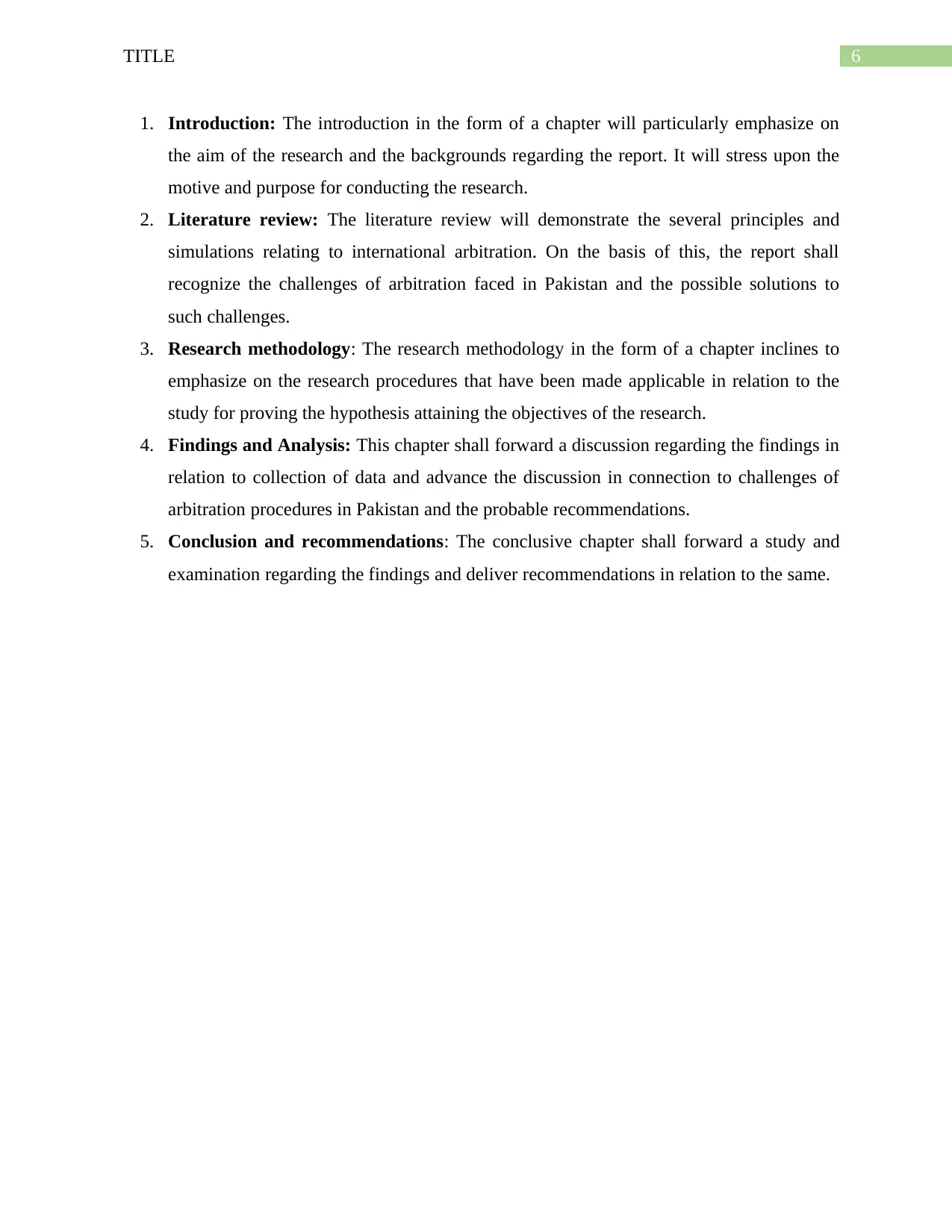
6TITLE
1. Introduction: The introduction in the form of a chapter will particularly emphasize on
the aim of the research and the backgrounds regarding the report. It will stress upon the
motive and purpose for conducting the research.
2. Literature review: The literature review will demonstrate the several principles and
simulations relating to international arbitration. On the basis of this, the report shall
recognize the challenges of arbitration faced in Pakistan and the possible solutions to
such challenges.
3. Research methodology: The research methodology in the form of a chapter inclines to
emphasize on the research procedures that have been made applicable in relation to the
study for proving the hypothesis attaining the objectives of the research.
4. Findings and Analysis: This chapter shall forward a discussion regarding the findings in
relation to collection of data and advance the discussion in connection to challenges of
arbitration procedures in Pakistan and the probable recommendations.
5. Conclusion and recommendations: The conclusive chapter shall forward a study and
examination regarding the findings and deliver recommendations in relation to the same.
1. Introduction: The introduction in the form of a chapter will particularly emphasize on
the aim of the research and the backgrounds regarding the report. It will stress upon the
motive and purpose for conducting the research.
2. Literature review: The literature review will demonstrate the several principles and
simulations relating to international arbitration. On the basis of this, the report shall
recognize the challenges of arbitration faced in Pakistan and the possible solutions to
such challenges.
3. Research methodology: The research methodology in the form of a chapter inclines to
emphasize on the research procedures that have been made applicable in relation to the
study for proving the hypothesis attaining the objectives of the research.
4. Findings and Analysis: This chapter shall forward a discussion regarding the findings in
relation to collection of data and advance the discussion in connection to challenges of
arbitration procedures in Pakistan and the probable recommendations.
5. Conclusion and recommendations: The conclusive chapter shall forward a study and
examination regarding the findings and deliver recommendations in relation to the same.
Paraphrase This Document
Need a fresh take? Get an instant paraphrase of this document with our AI Paraphraser
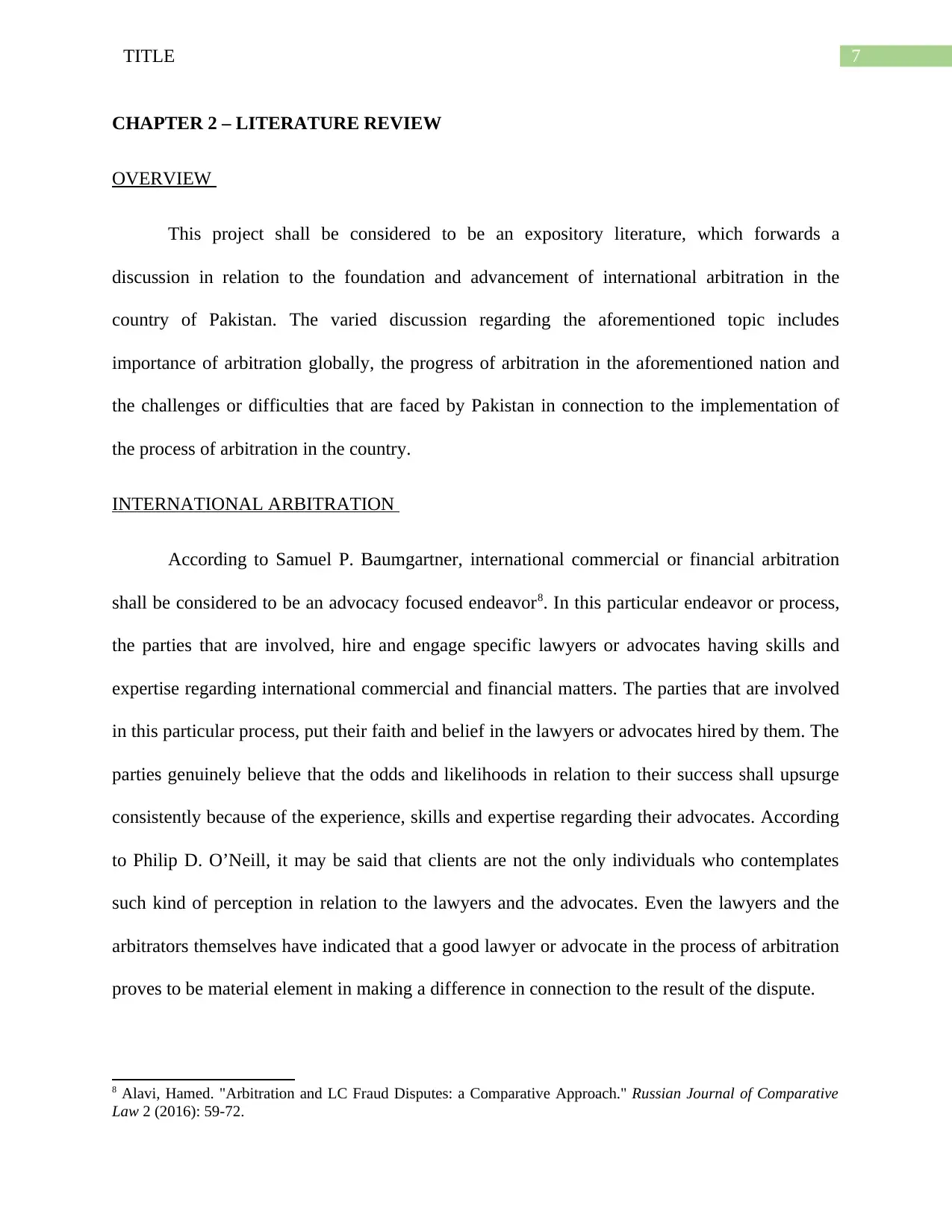
7TITLE
CHAPTER 2 – LITERATURE REVIEW
OVERVIEW
This project shall be considered to be an expository literature, which forwards a
discussion in relation to the foundation and advancement of international arbitration in the
country of Pakistan. The varied discussion regarding the aforementioned topic includes
importance of arbitration globally, the progress of arbitration in the aforementioned nation and
the challenges or difficulties that are faced by Pakistan in connection to the implementation of
the process of arbitration in the country.
INTERNATIONAL ARBITRATION
According to Samuel P. Baumgartner, international commercial or financial arbitration
shall be considered to be an advocacy focused endeavor8. In this particular endeavor or process,
the parties that are involved, hire and engage specific lawyers or advocates having skills and
expertise regarding international commercial and financial matters. The parties that are involved
in this particular process, put their faith and belief in the lawyers or advocates hired by them. The
parties genuinely believe that the odds and likelihoods in relation to their success shall upsurge
consistently because of the experience, skills and expertise regarding their advocates. According
to Philip D. O’Neill, it may be said that clients are not the only individuals who contemplates
such kind of perception in relation to the lawyers and the advocates. Even the lawyers and the
arbitrators themselves have indicated that a good lawyer or advocate in the process of arbitration
proves to be material element in making a difference in connection to the result of the dispute.
8 Alavi, Hamed. "Arbitration and LC Fraud Disputes: a Comparative Approach." Russian Journal of Comparative
Law 2 (2016): 59-72.
CHAPTER 2 – LITERATURE REVIEW
OVERVIEW
This project shall be considered to be an expository literature, which forwards a
discussion in relation to the foundation and advancement of international arbitration in the
country of Pakistan. The varied discussion regarding the aforementioned topic includes
importance of arbitration globally, the progress of arbitration in the aforementioned nation and
the challenges or difficulties that are faced by Pakistan in connection to the implementation of
the process of arbitration in the country.
INTERNATIONAL ARBITRATION
According to Samuel P. Baumgartner, international commercial or financial arbitration
shall be considered to be an advocacy focused endeavor8. In this particular endeavor or process,
the parties that are involved, hire and engage specific lawyers or advocates having skills and
expertise regarding international commercial and financial matters. The parties that are involved
in this particular process, put their faith and belief in the lawyers or advocates hired by them. The
parties genuinely believe that the odds and likelihoods in relation to their success shall upsurge
consistently because of the experience, skills and expertise regarding their advocates. According
to Philip D. O’Neill, it may be said that clients are not the only individuals who contemplates
such kind of perception in relation to the lawyers and the advocates. Even the lawyers and the
arbitrators themselves have indicated that a good lawyer or advocate in the process of arbitration
proves to be material element in making a difference in connection to the result of the dispute.
8 Alavi, Hamed. "Arbitration and LC Fraud Disputes: a Comparative Approach." Russian Journal of Comparative
Law 2 (2016): 59-72.
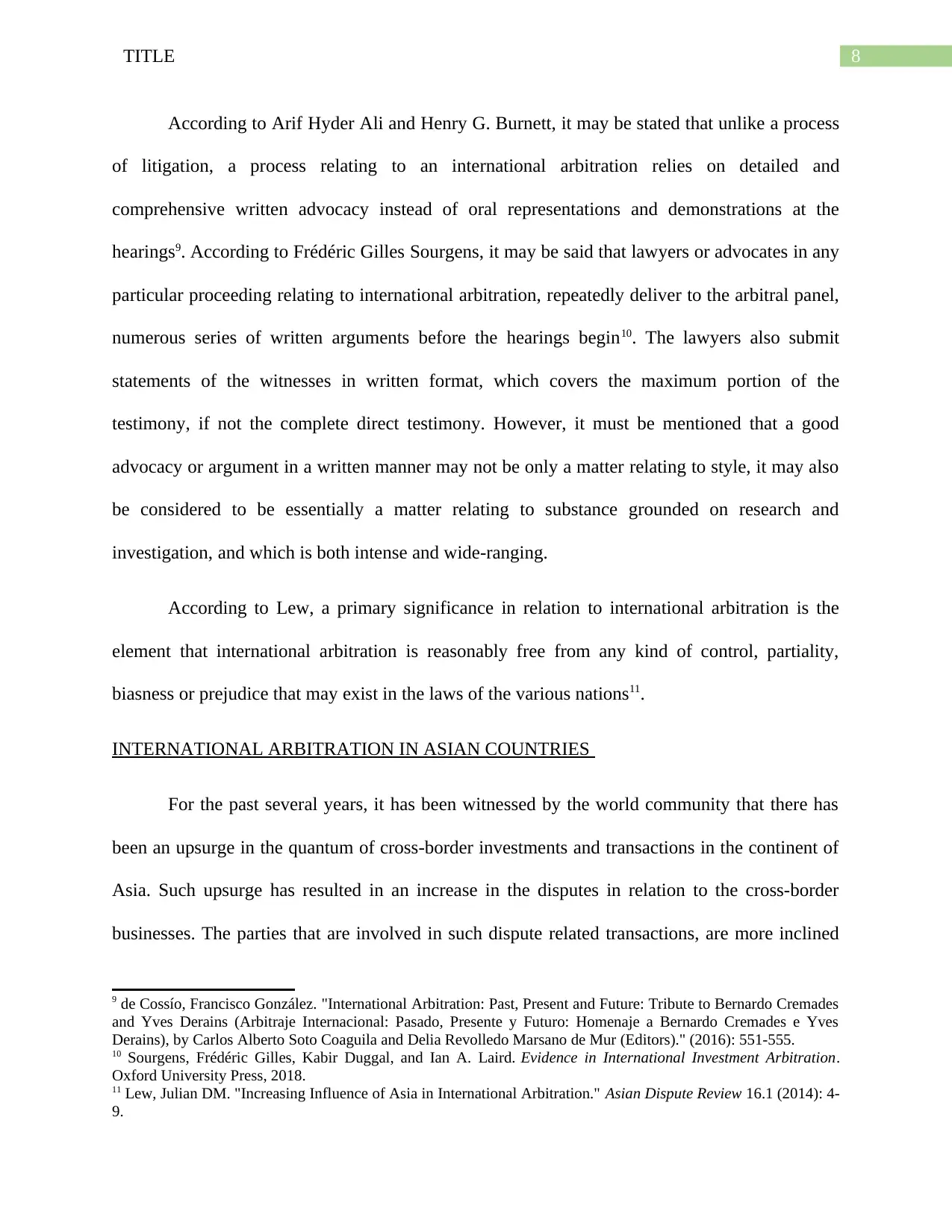
8TITLE
According to Arif Hyder Ali and Henry G. Burnett, it may be stated that unlike a process
of litigation, a process relating to an international arbitration relies on detailed and
comprehensive written advocacy instead of oral representations and demonstrations at the
hearings9. According to Frédéric Gilles Sourgens, it may be said that lawyers or advocates in any
particular proceeding relating to international arbitration, repeatedly deliver to the arbitral panel,
numerous series of written arguments before the hearings begin10. The lawyers also submit
statements of the witnesses in written format, which covers the maximum portion of the
testimony, if not the complete direct testimony. However, it must be mentioned that a good
advocacy or argument in a written manner may not be only a matter relating to style, it may also
be considered to be essentially a matter relating to substance grounded on research and
investigation, and which is both intense and wide-ranging.
According to Lew, a primary significance in relation to international arbitration is the
element that international arbitration is reasonably free from any kind of control, partiality,
biasness or prejudice that may exist in the laws of the various nations11.
INTERNATIONAL ARBITRATION IN ASIAN COUNTRIES
For the past several years, it has been witnessed by the world community that there has
been an upsurge in the quantum of cross-border investments and transactions in the continent of
Asia. Such upsurge has resulted in an increase in the disputes in relation to the cross-border
businesses. The parties that are involved in such dispute related transactions, are more inclined
9 de Cossío, Francisco González. "International Arbitration: Past, Present and Future: Tribute to Bernardo Cremades
and Yves Derains (Arbitraje Internacional: Pasado, Presente y Futuro: Homenaje a Bernardo Cremades e Yves
Derains), by Carlos Alberto Soto Coaguila and Delia Revolledo Marsano de Mur (Editors)." (2016): 551-555.
10 Sourgens, Frédéric Gilles, Kabir Duggal, and Ian A. Laird. Evidence in International Investment Arbitration.
Oxford University Press, 2018.
11 Lew, Julian DM. "Increasing Influence of Asia in International Arbitration." Asian Dispute Review 16.1 (2014): 4-
9.
According to Arif Hyder Ali and Henry G. Burnett, it may be stated that unlike a process
of litigation, a process relating to an international arbitration relies on detailed and
comprehensive written advocacy instead of oral representations and demonstrations at the
hearings9. According to Frédéric Gilles Sourgens, it may be said that lawyers or advocates in any
particular proceeding relating to international arbitration, repeatedly deliver to the arbitral panel,
numerous series of written arguments before the hearings begin10. The lawyers also submit
statements of the witnesses in written format, which covers the maximum portion of the
testimony, if not the complete direct testimony. However, it must be mentioned that a good
advocacy or argument in a written manner may not be only a matter relating to style, it may also
be considered to be essentially a matter relating to substance grounded on research and
investigation, and which is both intense and wide-ranging.
According to Lew, a primary significance in relation to international arbitration is the
element that international arbitration is reasonably free from any kind of control, partiality,
biasness or prejudice that may exist in the laws of the various nations11.
INTERNATIONAL ARBITRATION IN ASIAN COUNTRIES
For the past several years, it has been witnessed by the world community that there has
been an upsurge in the quantum of cross-border investments and transactions in the continent of
Asia. Such upsurge has resulted in an increase in the disputes in relation to the cross-border
businesses. The parties that are involved in such dispute related transactions, are more inclined
9 de Cossío, Francisco González. "International Arbitration: Past, Present and Future: Tribute to Bernardo Cremades
and Yves Derains (Arbitraje Internacional: Pasado, Presente y Futuro: Homenaje a Bernardo Cremades e Yves
Derains), by Carlos Alberto Soto Coaguila and Delia Revolledo Marsano de Mur (Editors)." (2016): 551-555.
10 Sourgens, Frédéric Gilles, Kabir Duggal, and Ian A. Laird. Evidence in International Investment Arbitration.
Oxford University Press, 2018.
11 Lew, Julian DM. "Increasing Influence of Asia in International Arbitration." Asian Dispute Review 16.1 (2014): 4-
9.
⊘ This is a preview!⊘
Do you want full access?
Subscribe today to unlock all pages.

Trusted by 1+ million students worldwide
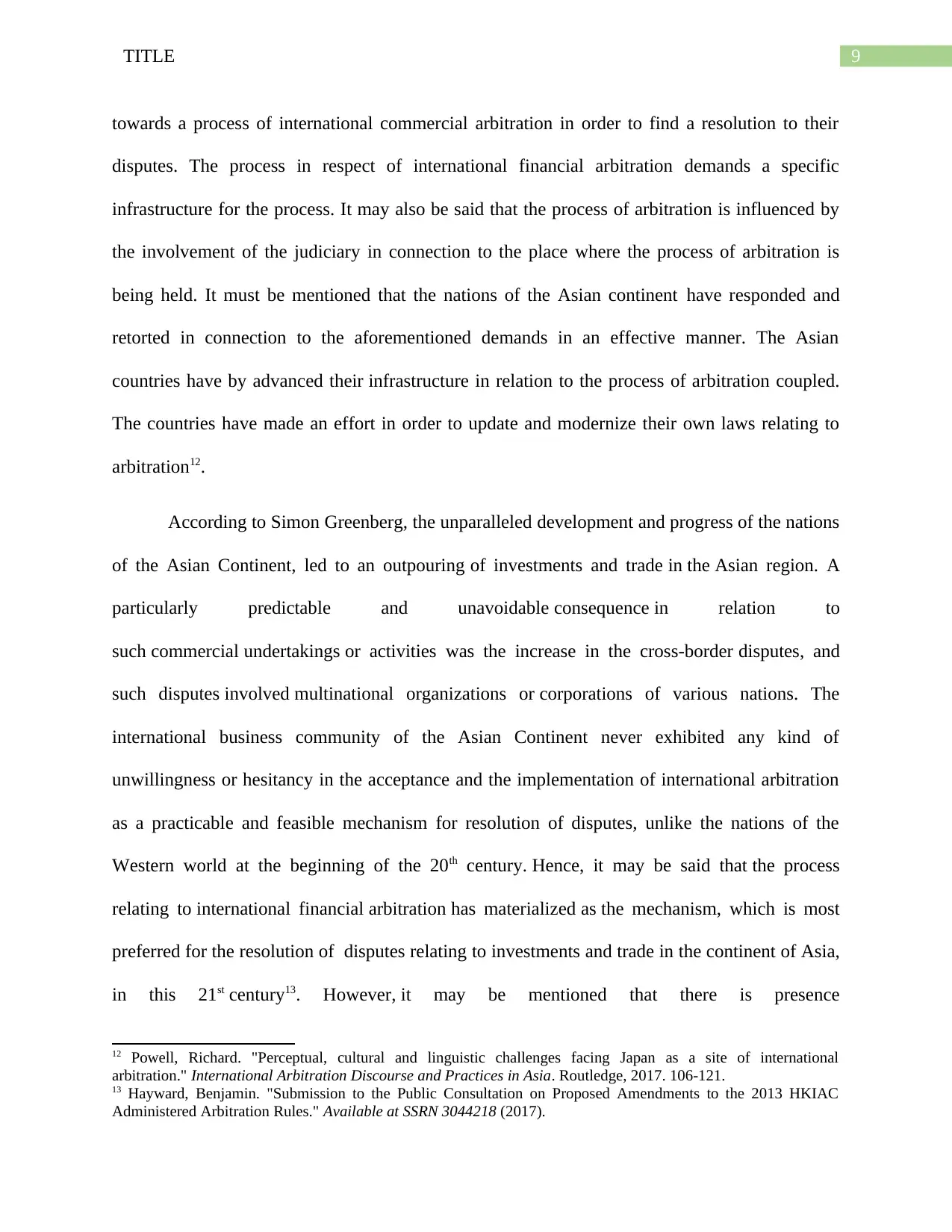
9TITLE
towards a process of international commercial arbitration in order to find a resolution to their
disputes. The process in respect of international financial arbitration demands a specific
infrastructure for the process. It may also be said that the process of arbitration is influenced by
the involvement of the judiciary in connection to the place where the process of arbitration is
being held. It must be mentioned that the nations of the Asian continent have responded and
retorted in connection to the aforementioned demands in an effective manner. The Asian
countries have by advanced their infrastructure in relation to the process of arbitration coupled.
The countries have made an effort in order to update and modernize their own laws relating to
arbitration12.
According to Simon Greenberg, the unparalleled development and progress of the nations
of the Asian Continent, led to an outpouring of investments and trade in the Asian region. A
particularly predictable and unavoidable consequence in relation to
such commercial undertakings or activities was the increase in the cross-border disputes, and
such disputes involved multinational organizations or corporations of various nations. The
international business community of the Asian Continent never exhibited any kind of
unwillingness or hesitancy in the acceptance and the implementation of international arbitration
as a practicable and feasible mechanism for resolution of disputes, unlike the nations of the
Western world at the beginning of the 20th century. Hence, it may be said that the process
relating to international financial arbitration has materialized as the mechanism, which is most
preferred for the resolution of disputes relating to investments and trade in the continent of Asia,
in this 21st century13. However, it may be mentioned that there is presence
12 Powell, Richard. "Perceptual, cultural and linguistic challenges facing Japan as a site of international
arbitration." International Arbitration Discourse and Practices in Asia. Routledge, 2017. 106-121.
13 Hayward, Benjamin. "Submission to the Public Consultation on Proposed Amendments to the 2013 HKIAC
Administered Arbitration Rules." Available at SSRN 3044218 (2017).
towards a process of international commercial arbitration in order to find a resolution to their
disputes. The process in respect of international financial arbitration demands a specific
infrastructure for the process. It may also be said that the process of arbitration is influenced by
the involvement of the judiciary in connection to the place where the process of arbitration is
being held. It must be mentioned that the nations of the Asian continent have responded and
retorted in connection to the aforementioned demands in an effective manner. The Asian
countries have by advanced their infrastructure in relation to the process of arbitration coupled.
The countries have made an effort in order to update and modernize their own laws relating to
arbitration12.
According to Simon Greenberg, the unparalleled development and progress of the nations
of the Asian Continent, led to an outpouring of investments and trade in the Asian region. A
particularly predictable and unavoidable consequence in relation to
such commercial undertakings or activities was the increase in the cross-border disputes, and
such disputes involved multinational organizations or corporations of various nations. The
international business community of the Asian Continent never exhibited any kind of
unwillingness or hesitancy in the acceptance and the implementation of international arbitration
as a practicable and feasible mechanism for resolution of disputes, unlike the nations of the
Western world at the beginning of the 20th century. Hence, it may be said that the process
relating to international financial arbitration has materialized as the mechanism, which is most
preferred for the resolution of disputes relating to investments and trade in the continent of Asia,
in this 21st century13. However, it may be mentioned that there is presence
12 Powell, Richard. "Perceptual, cultural and linguistic challenges facing Japan as a site of international
arbitration." International Arbitration Discourse and Practices in Asia. Routledge, 2017. 106-121.
13 Hayward, Benjamin. "Submission to the Public Consultation on Proposed Amendments to the 2013 HKIAC
Administered Arbitration Rules." Available at SSRN 3044218 (2017).
Paraphrase This Document
Need a fresh take? Get an instant paraphrase of this document with our AI Paraphraser
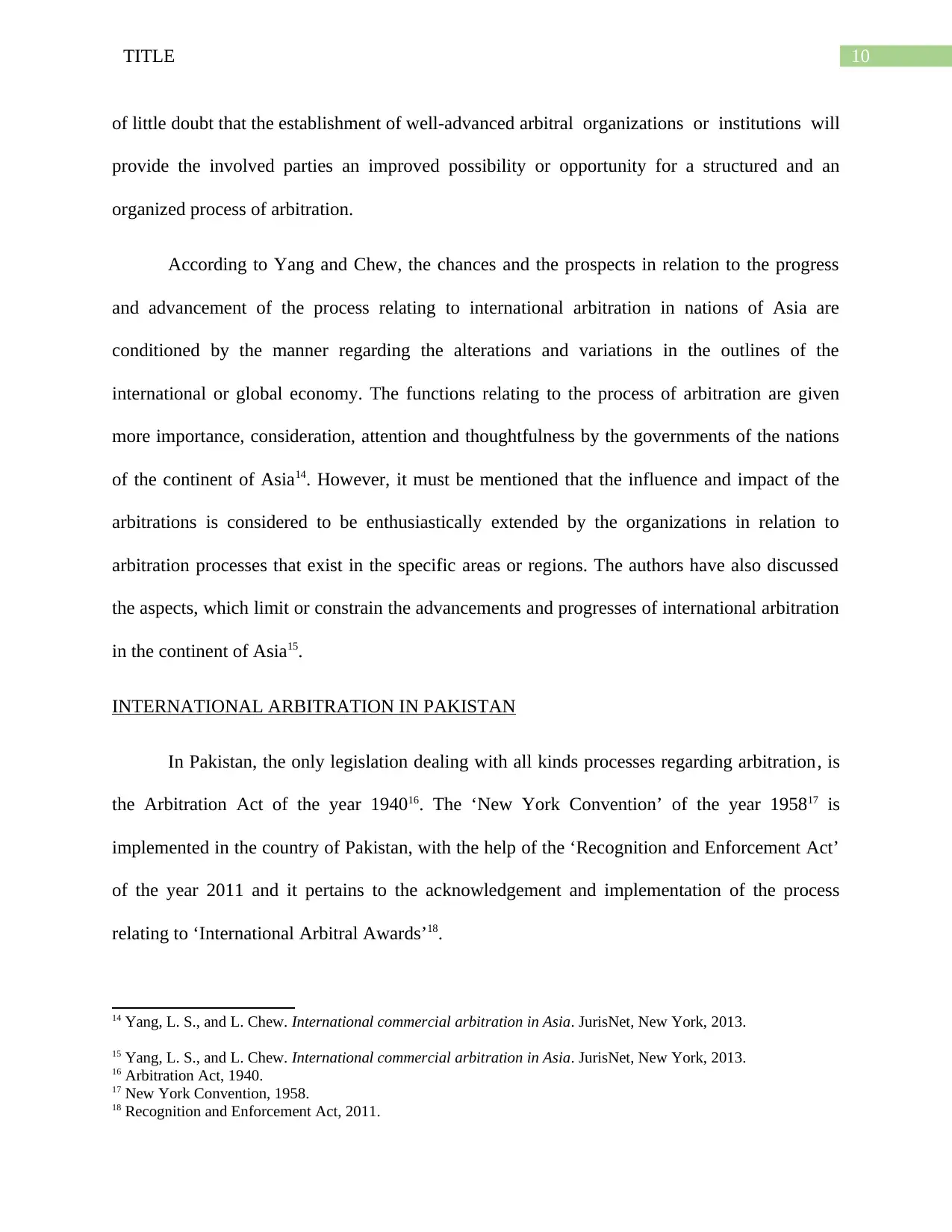
10TITLE
of little doubt that the establishment of well-advanced arbitral organizations or institutions will
provide the involved parties an improved possibility or opportunity for a structured and an
organized process of arbitration.
According to Yang and Chew, the chances and the prospects in relation to the progress
and advancement of the process relating to international arbitration in nations of Asia are
conditioned by the manner regarding the alterations and variations in the outlines of the
international or global economy. The functions relating to the process of arbitration are given
more importance, consideration, attention and thoughtfulness by the governments of the nations
of the continent of Asia14. However, it must be mentioned that the influence and impact of the
arbitrations is considered to be enthusiastically extended by the organizations in relation to
arbitration processes that exist in the specific areas or regions. The authors have also discussed
the aspects, which limit or constrain the advancements and progresses of international arbitration
in the continent of Asia15.
INTERNATIONAL ARBITRATION IN PAKISTAN
In Pakistan, the only legislation dealing with all kinds processes regarding arbitration, is
the Arbitration Act of the year 194016. The ‘New York Convention’ of the year 195817 is
implemented in the country of Pakistan, with the help of the ‘Recognition and Enforcement Act’
of the year 2011 and it pertains to the acknowledgement and implementation of the process
relating to ‘International Arbitral Awards’18.
14 Yang, L. S., and L. Chew. International commercial arbitration in Asia. JurisNet, New York, 2013.
15 Yang, L. S., and L. Chew. International commercial arbitration in Asia. JurisNet, New York, 2013.
16 Arbitration Act, 1940.
17 New York Convention, 1958.
18 Recognition and Enforcement Act, 2011.
of little doubt that the establishment of well-advanced arbitral organizations or institutions will
provide the involved parties an improved possibility or opportunity for a structured and an
organized process of arbitration.
According to Yang and Chew, the chances and the prospects in relation to the progress
and advancement of the process relating to international arbitration in nations of Asia are
conditioned by the manner regarding the alterations and variations in the outlines of the
international or global economy. The functions relating to the process of arbitration are given
more importance, consideration, attention and thoughtfulness by the governments of the nations
of the continent of Asia14. However, it must be mentioned that the influence and impact of the
arbitrations is considered to be enthusiastically extended by the organizations in relation to
arbitration processes that exist in the specific areas or regions. The authors have also discussed
the aspects, which limit or constrain the advancements and progresses of international arbitration
in the continent of Asia15.
INTERNATIONAL ARBITRATION IN PAKISTAN
In Pakistan, the only legislation dealing with all kinds processes regarding arbitration, is
the Arbitration Act of the year 194016. The ‘New York Convention’ of the year 195817 is
implemented in the country of Pakistan, with the help of the ‘Recognition and Enforcement Act’
of the year 2011 and it pertains to the acknowledgement and implementation of the process
relating to ‘International Arbitral Awards’18.
14 Yang, L. S., and L. Chew. International commercial arbitration in Asia. JurisNet, New York, 2013.
15 Yang, L. S., and L. Chew. International commercial arbitration in Asia. JurisNet, New York, 2013.
16 Arbitration Act, 1940.
17 New York Convention, 1958.
18 Recognition and Enforcement Act, 2011.
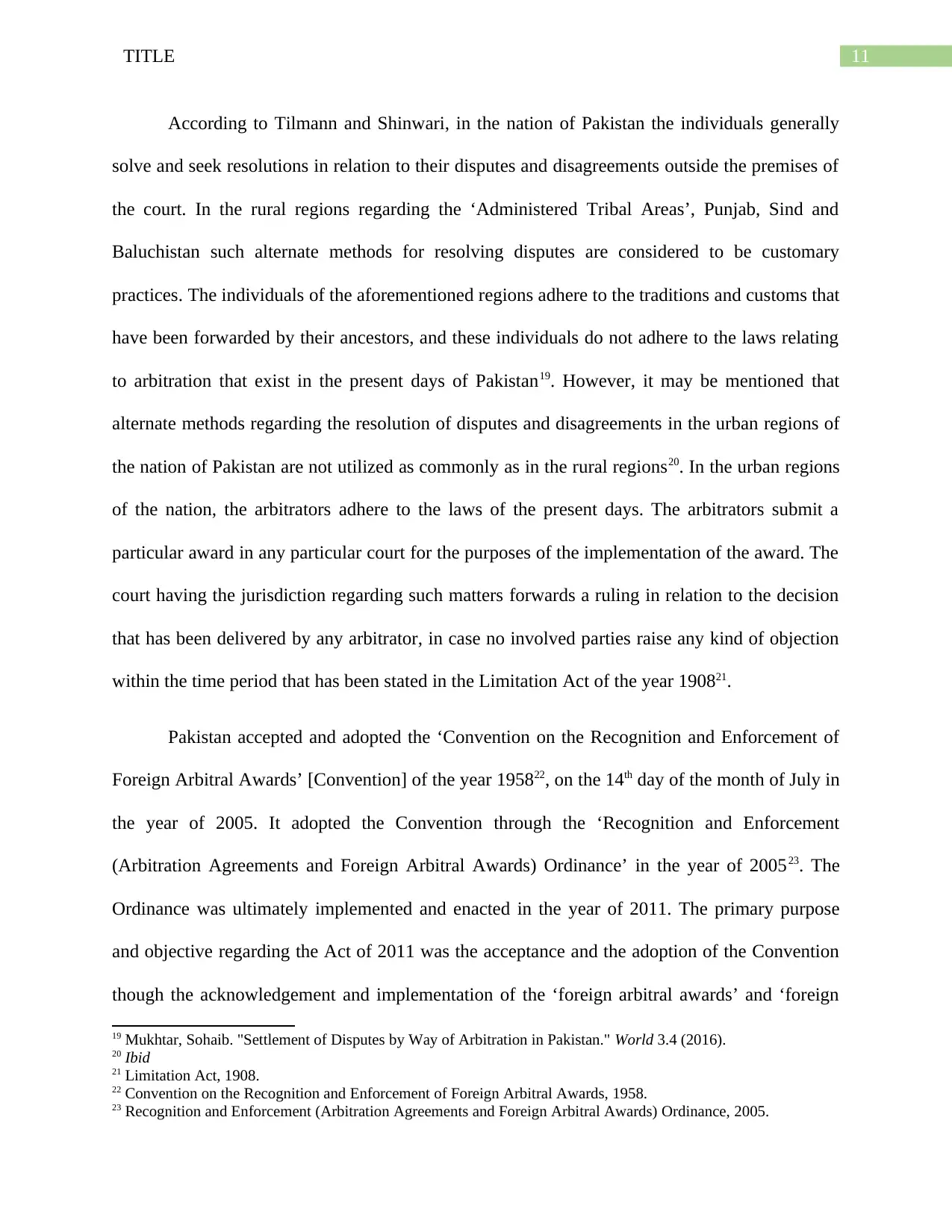
11TITLE
According to Tilmann and Shinwari, in the nation of Pakistan the individuals generally
solve and seek resolutions in relation to their disputes and disagreements outside the premises of
the court. In the rural regions regarding the ‘Administered Tribal Areas’, Punjab, Sind and
Baluchistan such alternate methods for resolving disputes are considered to be customary
practices. The individuals of the aforementioned regions adhere to the traditions and customs that
have been forwarded by their ancestors, and these individuals do not adhere to the laws relating
to arbitration that exist in the present days of Pakistan19. However, it may be mentioned that
alternate methods regarding the resolution of disputes and disagreements in the urban regions of
the nation of Pakistan are not utilized as commonly as in the rural regions20. In the urban regions
of the nation, the arbitrators adhere to the laws of the present days. The arbitrators submit a
particular award in any particular court for the purposes of the implementation of the award. The
court having the jurisdiction regarding such matters forwards a ruling in relation to the decision
that has been delivered by any arbitrator, in case no involved parties raise any kind of objection
within the time period that has been stated in the Limitation Act of the year 190821.
Pakistan accepted and adopted the ‘Convention on the Recognition and Enforcement of
Foreign Arbitral Awards’ [Convention] of the year 195822, on the 14th day of the month of July in
the year of 2005. It adopted the Convention through the ‘Recognition and Enforcement
(Arbitration Agreements and Foreign Arbitral Awards) Ordinance’ in the year of 200523. The
Ordinance was ultimately implemented and enacted in the year of 2011. The primary purpose
and objective regarding the Act of 2011 was the acceptance and the adoption of the Convention
though the acknowledgement and implementation of the ‘foreign arbitral awards’ and ‘foreign
19 Mukhtar, Sohaib. "Settlement of Disputes by Way of Arbitration in Pakistan." World 3.4 (2016).
20 Ibid
21 Limitation Act, 1908.
22 Convention on the Recognition and Enforcement of Foreign Arbitral Awards, 1958.
23 Recognition and Enforcement (Arbitration Agreements and Foreign Arbitral Awards) Ordinance, 2005.
According to Tilmann and Shinwari, in the nation of Pakistan the individuals generally
solve and seek resolutions in relation to their disputes and disagreements outside the premises of
the court. In the rural regions regarding the ‘Administered Tribal Areas’, Punjab, Sind and
Baluchistan such alternate methods for resolving disputes are considered to be customary
practices. The individuals of the aforementioned regions adhere to the traditions and customs that
have been forwarded by their ancestors, and these individuals do not adhere to the laws relating
to arbitration that exist in the present days of Pakistan19. However, it may be mentioned that
alternate methods regarding the resolution of disputes and disagreements in the urban regions of
the nation of Pakistan are not utilized as commonly as in the rural regions20. In the urban regions
of the nation, the arbitrators adhere to the laws of the present days. The arbitrators submit a
particular award in any particular court for the purposes of the implementation of the award. The
court having the jurisdiction regarding such matters forwards a ruling in relation to the decision
that has been delivered by any arbitrator, in case no involved parties raise any kind of objection
within the time period that has been stated in the Limitation Act of the year 190821.
Pakistan accepted and adopted the ‘Convention on the Recognition and Enforcement of
Foreign Arbitral Awards’ [Convention] of the year 195822, on the 14th day of the month of July in
the year of 2005. It adopted the Convention through the ‘Recognition and Enforcement
(Arbitration Agreements and Foreign Arbitral Awards) Ordinance’ in the year of 200523. The
Ordinance was ultimately implemented and enacted in the year of 2011. The primary purpose
and objective regarding the Act of 2011 was the acceptance and the adoption of the Convention
though the acknowledgement and implementation of the ‘foreign arbitral awards’ and ‘foreign
19 Mukhtar, Sohaib. "Settlement of Disputes by Way of Arbitration in Pakistan." World 3.4 (2016).
20 Ibid
21 Limitation Act, 1908.
22 Convention on the Recognition and Enforcement of Foreign Arbitral Awards, 1958.
23 Recognition and Enforcement (Arbitration Agreements and Foreign Arbitral Awards) Ordinance, 2005.
⊘ This is a preview!⊘
Do you want full access?
Subscribe today to unlock all pages.

Trusted by 1+ million students worldwide
1 out of 20
Related Documents
Your All-in-One AI-Powered Toolkit for Academic Success.
+13062052269
info@desklib.com
Available 24*7 on WhatsApp / Email
![[object Object]](/_next/static/media/star-bottom.7253800d.svg)
Unlock your academic potential
Copyright © 2020–2026 A2Z Services. All Rights Reserved. Developed and managed by ZUCOL.





